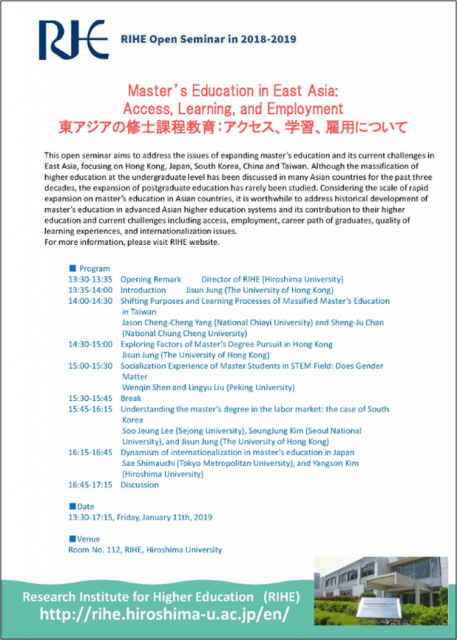 以下のとおり公開研究会を開催いたしますので、ご案内いたします。
以下のとおり公開研究会を開催いたしますので、ご案内いたします。
■日時
平成31年1月11日(金)13:30~17:15
■場所
RIHE授業研究開発室
■テーマ
東アジアの修士課程教育:アクセス、学習、雇用について
■発表者
Jisun Jung氏 (香港大学)
Jason Cheng-Cheng Yang氏 (国立嘉義大学)
Sheng-Ju Chan氏 (国立中正大学)
Wenqin Shen氏 (北京大学)
Lingyu Liu氏 (北京大学)
Soo Jeung Lee氏 (世宗大学校)
Jisun Jung氏 (香港大学)
SeungJung Kim氏 (ソウル大学校)
Sae Shimauchi氏 (首都大学東京)
Yangson Kim氏 (広島大学)
■プログラム
13:30-13:35 Opening Remark Director of RIHE (Hiroshima University)
13:35-14:00 Introduction Jisun Jung (The University of Hong Kong)
14:00-14:30 Shifting Purposes and Learning Processes of Massified Master’s Education in Taiwan
Jason Cheng-Cheng Yang (National Chiayi University) and Sheng-Ju Chan (National Chung Cheng University)
14:30-15:00 Exploring Factors of Master’s Degree Pursuit in Hong Kong
Jisun Jung (The University of Hong Kong)
15:00-15:30 Socialization Experience of Master Students in STEM Field: Does Gender Matter
Wenqin Shen and Lingyu Liu (Peking University)
15:30-15:45 Break
15:45-16:15 Understanding the master’s degree in the labor market: the case of South Korea
Soo Jeung Lee (Sejong University), SeungJung Kim (Seoul National University), and
Jisun Jung (The University of Hong Kong)
16:15-16:45 Dynamism of internationalization in master’s education in Japan
Sae Shimauchi (Tokyo Metropolitan University), and Yangson Kim (Hiroshima University)
16:45-17:15 Discussion
■概要
This open seminar aims to address the issues of expanding master’s education and its current challenges in East Asia, focusing on Hong Kong, Japan, South Korea, China and Taiwan. Although the massification of higher education at the undergraduate level has been discussed in many Asian countries for the past three decades, the expansion of postgraduate education has rarely been studied. Considering the scale of rapid expansion on master’s education in Asian countries, it is worthwhile to address historical development of master’s education in advanced Asian higher education systems and its contribution to their higher education and current challenges including access, employment, career path of graduates, quality of learning experiences, and internationalization issues.
The seminar begins by describing the key changes in the higher education environment in relation to master’s education locally, regionally, and globally, and highlights major challenges of master’s education in each case country. Different issues in master’s education in each case higher education system will be presented and compared and common challenges will be discussed. For instance, master’s education in Taiwan will be discussed in the context of massified higher education and its shifting purposes and learning processes of master’s students will be suggested. In the case of Hong Kong, diverse factors including economic, social, academic, and cultural will be examined in students’ decision making in pursuing of master’s degree. Korean case will demonstrate whether master’s degree improves students’ employment outcomes or not and the results will be compared across the types of master’s programmes. A majority of students in master’s degree pursue doctoral degree and academic career path, thus, Chinese case will present what factors make the transition from master to doctoral level. Lastly, several master’s degree programmes in East Asia are currently recruiting many foreign students, and the Japanese case will show how internationalization affects master’s programmes and students’ educational experiences.
■使用言語
英語
■申し込み
[trust-form id=14489]
